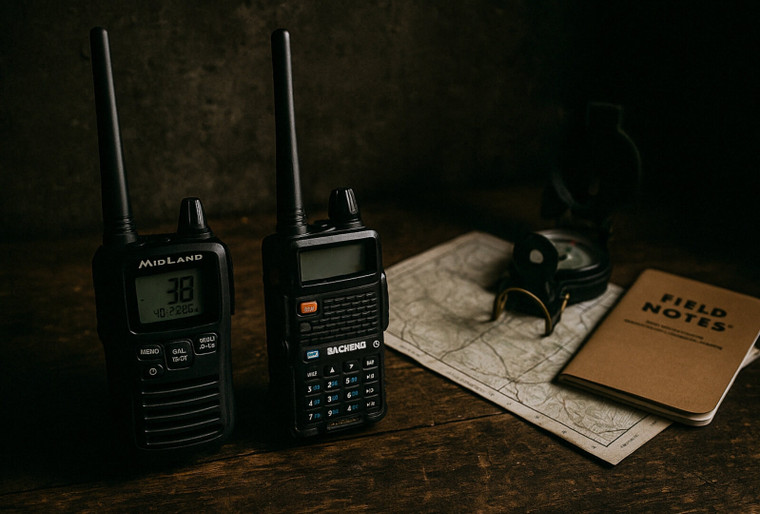Building the Civilian Comms Mindset
Posted by Warrior Poet Society on Oct 24th 2025
In the military, the formula was simple: shoot, move, communicate. Each piece depended on the others, but without communication, everything can fall apart.
Many civilians who prepare for uncertain times understand shooting and moving. They train with their firearms. They plan escape routes, bug-out bags, and contingency plans. But communication—the ability to send and receive reliable information—usually comes last, if it comes at all.
I hope you’ve taken the time to create good communication habits and patterns with those inside your immediate preparedness circle (hand signals, code/danger words, meet up/rendezvous points, etc.), but have you thought beyond what happens if the cell or internet network goes down? I’m going to point you in the right direction regarding your need for reliable radio communications.
Why Communication Matters
Preparedness isn’t just about gear; it’s about systems that work when nothing else does. Food, water, and security all matter, but communication ties them together.
A few years ago, I realized that I needed to close this gap in my own preparedness. If you can’t communicate, you’re already losing, and I was losing in this area.
Keep in mind that it doesn’t have to be end of the world/rebuild society type stuff either. A reliable communication plan and system can save your life during natural disasters, getting lost, or regrouping with loved ones after a nefarious attack (like the Las Vegas shooting, The Boston Bombing, or something bigger like Nine-Eleven).
In a crisis, information can become as valuable as ammunition. Knowing what’s happening, where it’s happening, and who needs help can make the difference between chaos and coordination, life and death. Radios help fill that gap. They operate independently of cell towers, the internet, or the power grid. They’re a bridge between isolation and awareness.
I’m reminded that most of us are surrounded by resources we don’t use. Just about every county in the country has a local ham radio club. Getting licensed isn’t difficult, and it opens access to a world of capability of which few people take advantage.
Remember, in Independence Day, we defeated the aliens by using low tech comms to communicate across the world (might be beneficial to learn Morse Code as well, SOS at the very least—just saying—because apparently there is a giant alien rock/ship/thing headed our way).
Building a Practical Setup
A good starting point is a set of radios that can handle both UHF and VHF frequencies. Those bands cover most local and regional communication, and they’re compatible with community repeaters that can extend range well beyond line of sight.
Anyone can assemble a reliable system that connects them to their community when the lights go out. Nothing complicated, nothing super expensive; just functional.
Learning the Language
The first time you listen to a ham radio conversation, it can sound like another language. Call signs, frequencies, protocols, it takes practice. But that’s the point. Like any other discipline, communication is learned by doing. Difficulty is often an excuse we hide behind. With a little effort, the barrier disappears.
The payoff is freedom. When you know how to operate your own communications system, you’re no longer dependent on anyone else to tell you what’s happening. You can send word, receive updates, and coordinate action without permission.
A Missing Piece of Readiness
We talk a lot about mindset—about courage, faith, and discipline. Communication deserves the same attention. It’s the nervous system of preparedness.
The warrior who can’t communicate fights alone. The family that can’t coordinate becomes isolated. The neighborhood without a network is vulnerable.
Building the civilian comms mindset is about responsibility. It’s choosing not to be blind or deaf when the world goes quiet.
Remember, Train Hard. Train Smart. And lock in your comms.

